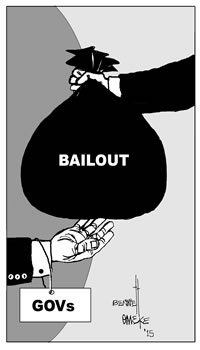National Issues
Salary arrears: The workers are not to blame -By Niyi Akinnaso

No matter how quickly they may wish away the lingering crisis of salary arrears, Nigerian governors and the workers are locked in a tug-of-war for some time to come. President Muhammadu Buhari’s relief package (mischievously tagged a bailout) notwithstanding, the problem of salary arrears will take years to resolve.
There are two major reasons for this situation. First, the term “salary arrears” must be understood as a complex category, used as a shorthand for a variety of unpaid emoluments, including salaries, pension entitlements, earned allowances, and salary deductions that were never paid to the right quarters. Second, there is as yet no permanent solution in sight for preventing the shortfall in federal allocations, which caused the salary crisis in the first place: There are still many states out there whose monthly allocations will be insufficient in paying their monthly wage bill for many more months. It is also important to note that the present relief package will not be sufficient in paying off the salary arrears of many a heavy indebted state.
Nevertheless, the temporary relief being offered by the Buhari administration provides enough basis to further examine the problem of non-payment of salaries as and at when due. Why did the problem occur, and who is responsible? More importantly, what can be done to avoid the situation in the future?
There are two major groups of offenders, namely, federal and state government executives. The scale of the Federal Government’s culpability has yet to be fully determined. However, we now know enough to accuse former President Goodluck Jonathan and his economic team of gross financial irresponsibility. That cheeky lady at the head of his economic team was less than candid with the nation.
In addition to the fall in oil prices, we now know (1) that the stealing of our crude oil may have been carried out by some powerful ministers and friends of the Jonathan administration, rather than by some unknown thieves; (2) that the money lost to corruption by the Jonathan administration may have been enough to pay all outstanding salary arrears; (3) that, while assuring the nation that the economy was healthy, the Jonathan administration disguised the situation by borrowing money to pay the salaries of federal workers for the first four months of 2015, thereby running the government into a deeper debt hole; and (4) that, yet, Jonathan floated his presidential campaign with a rain of dollars.
These facts were known to many governors at the time. Unfortunately, they, too, were caught up either in their own re-election or in the election of their party’s presidential candidate. Even some workers, whose salaries were outstanding, got caught up in the election campaigns and sought temporary financial relief in election campaign slush funds.
This, however, does not absolve the governors of culpability. To start with, they were forewarned about tough days ahead. Sometime in December 2014, Dr. Ngozi Okonjo-Iweala, then Finance Minister, announced austerity measures in recognition of the downturn in the economy, owing to a fall in oil prices.
In “Austerity begins at home”, I subsequently reviewed Okonjo-Iweala’s austerity measures and commented as follows: “… As I write to wish you a Merry Christmas and a Happy New Year, I must hasten to add that the years ahead will be rough, because the government’s money-glass is being depleted at a faster rate than anticipated. We are all victims of the depletion but some of us experience it firsthand. Those who work for the government as civil servants, teachers, doctors, nurses, contractors, and consultants are direct victims” (December 23, 2015).
The governors should have taken steps since December last year to pay more attention to workers’ salaries by adopting a multi-stage strategy. First, the most vulnerable workers on salary steps 1-5 should have been paid on a regular basis. This should be followed by middle-level earners as more funds become available. Moreover, no worker should have been left out in the cold for more than two months without getting some pay, if only a part-payment. The idea of a complete shutout of all workers from salary payment was a grave mistake. It was also a grave mistake not to have apprised the relevant labour unions of the situation long before they waded in.
True, there were drastic reductions in federal allocations to the states, the truth is that many states typically engage in one non-productive project or the other, which often ties down funds that could be more usefully deployed elsewhere. Projects, such as the multibillion naira stadium in Akwa Ibom; the Dome in Ondo; and the surveillance helicopter in Osun have now turned out to have run against the financial tide. The Osun helicopter in particular has lent itself to so much negative reading that it should be sold or leased for short-term funds.
The cost of running government in Nigeria must rank among the highest in the world, with a recurrent expenditure of over 70 per cent of the budget. It begins with an unnecessarily large workforce. There are far too many commissioners, special advisers, and (senior) special assistants. Ten commissioners should be sufficient for each state. And why are they all chauffeur-driven, when they normally drive themselves into and out of government?
What many citizens find even more detestable is the large size of the governors’ entourage, especially when going out of state. Why more than five vehicles? Put the governor and his ADC in one. Put relevant government functionaries in another. Put all support staff in a third vehicle. Add two pilots, one in front and another behind the convoy. Finish.
At the federal level, President Buhari provided a good example by rejecting the purchase of new vehicles that would have cost over N400m. He should add the sale of superfluous airplanes in the presidential fleet. Beyond these token gestures, the number of ministers should be reduced to the barest minimum.
The United States Government has only 15 cabinet members, called Secretaries, besides the President and Vice-President, and an additional seven cabinet-rank members, including the Chief of Staff. There are no “ministers-of-state”. Yet, the US has 50 states with a population of about 325 million people. There is no reason whatsoever why Nigeria should have more that 25 or so ministers. The post of minister of state is wasteful and should be discarded.
The ongoing salary problem should be enough reason to begin to prune the workforce. True, the government is the largest employer of labour in Nigeria; but more attention should begin to be paid to infrastructural development and a variety of social programmes that would reach many more citizens. The use of employment as a political reward should be cut down.
Just as this piece was being sent out for processing, news broke that as many as 19 states of the federation owe the West African Examinations Council examination fees worth over N4bn for the students who enrolled for the Senior School Certificate examinations in their states. It is yet another evidence of financial stress on the states.


















